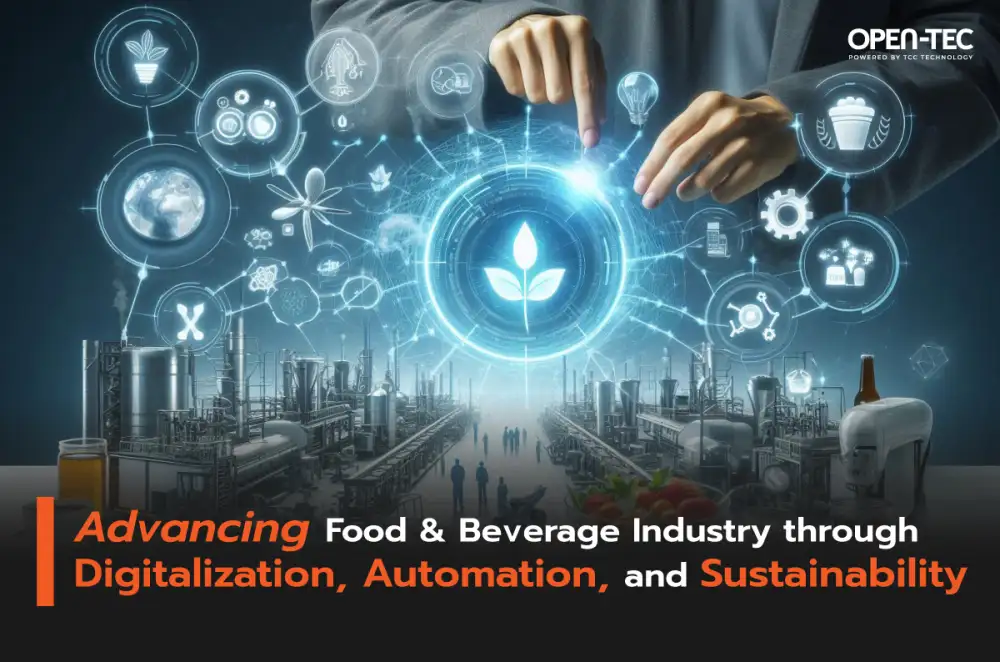
The global food and beverage industry is facing major challenges, driven by rapidly changing consumer behaviors and the impacts of an uncertain climate. Organizations that can adapt and emerge as leaders among others during these changes will be the ones that survive and grow sustainably in the long term. Therefore, digital technology, automation, and sustainability approaches are no longer just optional strategies but have become essential factors for building competitive capability and organizational resilience. Today, OPEN-TEC (Tech Knowledge Sharing Platform), powered by TCC TECHNOLOGY GROUP, will take you to explore ways to prepare for the future of the food and beverage industry.
Digital Technology: The Key to Agility
As digital transformation becomes a crucial driving force, food and beverage manufacturers must accelerate their adaptation to maintain a competitive advantage. Related to the goals of increasing productivity, reducing waste, and enhancing transparency in complex supply chains, the journey toward becoming a digital organization may seem challenging. However, technology solutions such as cloud platforms and modular software play a vital role in enabling organizations to start smoothly and efficiently. Embracing digitalization not only boosts operational efficiency but also lays a strong foundation for building intelligent, flexible systems ready to face future challenges.
Automation: Accelerating Efficiency and Empowering TeamsIn the food and beverage industry, implementing automation not only speeds up production processes but also plays a key role in enhancing employee agility. Technologies such as robotic assistants, AI-powered quality control systems, and real-time sensors help increase production efficiency, reduce energy consumption, and consistently maintain product quality standards. However, the goal of automation is not to replace human labor but to reduce repetitive tasks, allowing personnel more time and resources for creating creativity, strategic decision-making, and driving innovation within the organization.
Sustainability: From Cost to Business Opportunity
Sustainability is no longer just a trend but has become a core element in building future-ready businesses. In the food and beverage industry, rising consumer awareness alongside stricter environmental regulations is pushing manufacturers to rethink resource usage, reduce waste, and operate with social and environmental responsibility. Many organizations are turning these challenges into opportunities by adopting circular economy policies. Materials once considered waste, such as seafood scraps, meat residues, or leftover crops, are being transformed into valuable products like animal feed, organic fertilizers, or bio-based materials. These changes not only help reduce environmental impact but also open new revenue streams for businesses. Efforts in water and energy conservation, the use of sustainable packaging, and sourcing ingredients from trusted suppliers are becoming standard practices in the industry.
Collaboration: Building Capability
While technology is a key driver of the future for the Food and Beverage industry, it is people who ultimately shape its direction. Creating future-ready operations requires more than just the right tools, it demands collaboration across all sectors. Governments, educational institutions, technology providers, and manufacturers must work together to drive innovation and tackle shared challenges. Moreover, another important thing is workforce readiness. Investing in new skills, digital literacy, and fostering a culture of continuous learning will ensure that transformation is smooth, inclusive, and sustainable. When people understand the reasons and goals behind the changes, they are more willing to embrace them and move forward together.
As mentioned above, the path forward for Food and Beverage industry is both challenging and filled with opportunities. Digital technology, automation, and sustainability are not separate factors, but complementary strategies that work together to build a smarter, more resilient, and sustainably growing industry. This content includes insights gathered from the discussion sessions at the "Siemens F&B Technology Summit 2025."